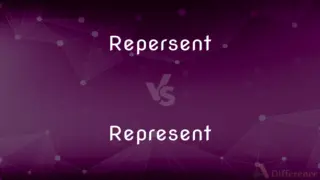Ablety vs. Ability — Which is Correct Spelling?
Edited by Tayyaba Rehman — By Fiza Rafique — Updated on April 1, 2024
"Ablety" is an incorrect spelling of "Ability." Ability is the capacity to do something or perform effectively.

Table of Contents
Which is correct: Ablety or Ability
How to spell Ability?

Ablety
Incorrect Spelling

Ability
Correct Spelling
ADVERTISEMENT
Key Differences
Relate to familiarity: "liability" has the same "ility" ending.
Practice writing "ability" regularly to solidify the correct spelling in your mind.
Remember the root word "able." Just add "ity" at the end.
Visualize a ladder; climb to "ability" with clear steps, not a faulty "ablety" one.
Sound it out: A-bil-i-ty; focusing on the "bil" part.
ADVERTISEMENT
How Do You Spell Ability Correctly?
Incorrect: His ablety to communicate effectively won him many friends.
Correct: His ability to communicate effectively won him many friends.
Incorrect: He showed great ablety in mathematics.
Correct: He showed great ability in mathematics.
Incorrect: Her ablety to solve complex problems is impressive.
Correct: Her ability to solve complex problems is impressive.
Incorrect: She admired the bird's ablety to fly high above the trees.
Correct: She admired the bird's ability to fly high above the trees.
Incorrect: The team's ablety to work together made them successful.
Correct: The team's ability to work together made them successful.
Ability Definitions
The power or skill to do something.
She has the ability to speak multiple languages.
The means or skill to perform.
The software enhances the user's ability to edit photos.
Competence based on training or experience.
Her leadership ability is unparalleled.
A natural talent or aptitude.
His artistic ability is evident in his paintings.
The quality of being able to do something, especially the physical, mental, financial, or legal power to accomplish something.
A skill, talent, or capacity
A student of many abilities.
The quality of being suitable for or receptive to a specified treatment
The ability of a computer to be configured for use as a file server. See Usage Note at able.
(obsolete) Suitableness.
(uncountable) The quality or state of being able; capacity to do or of doing something; having the necessary power.
This phone has the ability to have its software upgraded wirelessly.
This wood has the ability to fight off insects, fungus, and mold for a considerable time.
The legal wherewithal to act.
Physical power.
(archaic) Financial ability.
(uncountable) A unique power of the mind; a faculty.
(countable) A skill or competence in doing; mental power; talent; aptitude.
They are persons of ability, who will go far in life.
She has an uncanny ability to defuse conflict.
A mixed-ability class
The quality or state of being able; power to perform, whether physical, moral, intellectual, conventional, or legal; capacity; skill or competence in doing; sufficiency of strength, skill, resources, etc.; - in the plural, faculty, talent.
Then the disciples, every man according to his ability, determined to send relief unto the brethren.
Natural abilities are like natural plants, that need pruning by study.
The public men of England, with much of a peculiar kind of ability.
The quality of being able to perform; a quality that permits or facilitates achievement or accomplishment
Possession of the qualities (especially mental qualities) required to do something or get something done;
Danger heightened his powers of discrimination
Physical or mental capacity.
The test measures one's mathematical ability.
Ability Meaning in a Sentence
The athlete's ability to run fast earned him a gold medal.
She has the ability to learn languages quickly.
Her artistic ability was recognized at a young age.
His ability to play the piano amazed everyone.
Their ability to solve puzzles was evident in the competition.
The team demonstrated their ability to work under pressure.
The ability to adapt to change is important in life.
His ability to remember facts helped him win the quiz show.
Her ability to design beautiful clothes launched her fashion career.
The ability to listen is as important as the ability to speak.
The ability to stay calm in emergencies can save lives.
Her singing ability won her the first prize in the competition.
The ability to solve mathematical problems quickly was his key to success.
Students showed their ability to think critically during the debate.
The ability to focus for long periods is crucial for success.
Her ability to write compelling stories was undeniable.
The ability to lead is a valuable trait in any profession.
His ability to make people laugh made him very popular.
Teachers nurture the ability of their students to learn and grow.
Cooks need the ability to taste and adjust flavors accurately.
Ability Idioms & Phrases
An ability to remember
Having a good memory.
Her ability to remember names and faces made her an excellent hostess.
Common Curiosities
What is the pronunciation of Ability?
It is pronounced as /əˈbɪl.ɪ.ti/.
What is the root word of Ability?
The root word is "able."
Which vowel is used before Ability?
In a sentence, any vowel could precede the word "ability," depending on context.
What is the plural form of Ability?
The plural form is "abilities."
Why is it called Ability?
"Ability" comes from the Latin word "habilitas," meaning aptitude or competence.
What is the verb form of Ability?
The verb related to "ability" is "enable."
Is Ability an adverb?
No, "ability" is not an adverb.
Is Ability an abstract noun?
Yes, "ability" is an abstract noun as it represents a concept rather than a tangible item.
Which conjunction is used with Ability?
Any conjunction can be used with "ability" depending on the sentence structure, such as "and," "but," or "or."
Is Ability a noun or adjective?
"Ability" is a noun.
Is Ability a collective noun?
No, "ability" is not a collective noun.
What is the singular form of Ability?
"Ability" is already in its singular form.
Which article is used with Ability?
Both "a" and "an" can be used with "ability" based on the structure of the sentence.
What part of speech is Ability?
"Ability" is a noun.
Which preposition is used with Ability?
Commonly used prepositions with "ability" include "of," "to," and "in."
Is Ability a negative or positive word?
"Ability" is neutral but is often used in a positive context.
Is the Ability term a metaphor?
No, "ability" is not typically used as a metaphor.
Is the word Ability is imperative?
No, "ability" is not an imperative verb.
Is the word Ability is Gerund?
No, "ability" is not a gerund.
What is the opposite of Ability?
The opposite of "ability" is "inability."
Is Ability a countable noun?
Yes, "ability" is a countable noun. For instance, "He has many abilities."
How many syllables are in Ability?
There are four syllables in "ability."
Is Ability a vowel or consonant?
"Ability" is a word, not a vowel or consonant. The word itself contains both vowels and consonants.
Is the word “Ability” a Direct object or an Indirect object?
"Ability" can function as a direct object depending on the sentence, e.g., "She showcased her ability."
How do we divide Ability into syllables?
A-bil-i-ty.
What is a stressed syllable in Ability?
The second syllable, "bil," is stressed in "ability."
What is another term for Ability?
Another term for "ability" is "capacity."
Share Your Discovery

Previous Comparison
Tireing vs. Tiring
Next Comparison
Repersent vs. RepresentAuthor Spotlight
Written by
Fiza RafiqueFiza Rafique is a skilled content writer at AskDifference.com, where she meticulously refines and enhances written pieces. Drawing from her vast editorial expertise, Fiza ensures clarity, accuracy, and precision in every article. Passionate about language, she continually seeks to elevate the quality of content for readers worldwide.
Edited by
Tayyaba RehmanTayyaba Rehman is a distinguished writer, currently serving as a primary contributor to askdifference.com. As a researcher in semantics and etymology, Tayyaba's passion for the complexity of languages and their distinctions has found a perfect home on the platform. Tayyaba delves into the intricacies of language, distinguishing between commonly confused words and phrases, thereby providing clarity for readers worldwide.


































